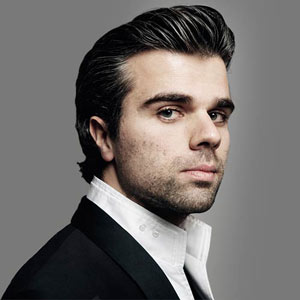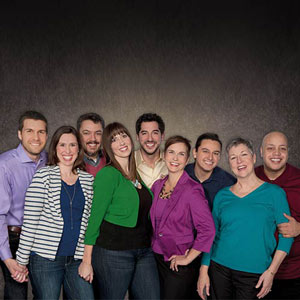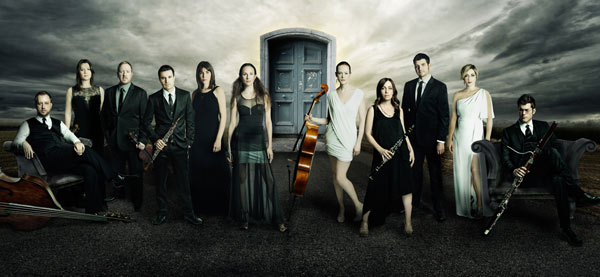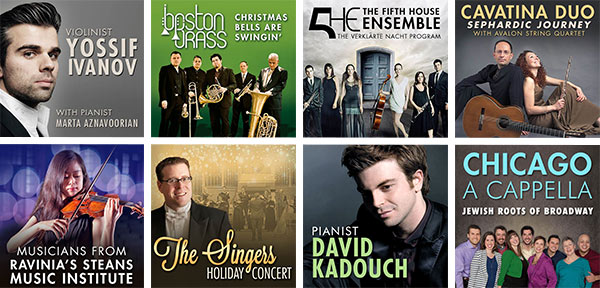The Worldly Series of Music
Ravinia’s concert calendar has long featured a veritable cornucopia of the world’s venerated artists, from established masters to cutting-edge talents. With the 2011 launch of the $10 BGH Classics series, the festival’s most intimate concert space—the 450-seat Bennett Gordon Hall—became host to a microcosm of Ravinia’s musical diversity, and since 2012 that superlative cultural experience has been available year-round. And best of all, the series offers music lovers the chance to hear “an impressive lineup, by any standard,” (Chicago Tribune) of world-stage stars at a fraction of the ticket price commanded elsewhere.
Just ahead of his first performance with the Chicago Symphony Orchestra downtown, in 2012 Tchaikovsky Competition–winning pianist Daniil Trifonov appeared on the BGH series at Ravinia, where he returns in 2016 as a soloist with the CSO. The Tribune said he “brought a coiled-spring energy” to his recent performance at Symphony Center, but also “rendered with rapt fluidity so many enticing shades of softness” in his solo encore of Debussy’s Reflets dans l’eau, just one of the many works that had formed his Ravinia recital. Last season Ravinia audiences similarly got to experience the pianism of Denis Kozhukhin ahead of his CSO debut playing Ravel’s Concerto for the Left Hand, in which the Tribune proclaimed, “It was hard to believe he could deliver such commanding sound and spot-on accuracy using only five fingers.” Plaudits have also followed Benjamin Grosvenor since his 2013 Ravinia debut on the BGH series. Making his debut at London’s Barbican earlier this year, the pianist “played with filigree delicacy and a feeling for pianistic color that will have won new admirers” (The Telegraph), and The Guardian observed that “the engulfing tone of [his] climaxes was impressive, yet the quieter moments ... were just as striking.”
 David KadouchThe fall/winter/spring leg of the $10 BGH Classics series begins on October 24 with pianist David Kadouch. Named “Young Artist of the Year” in the 2011 International Classical Music Awards, he has navigated recitals at the Metropolitan Museum of Art in New York and the Louvre in Paris, as well as the Verbier Festival and Salle Pleyel, en route to his Ravinia debut with a program that epitomizes the worldliness of classical music. Via Germany, Kadouch will traverse endless, mysterious forests in Schumann’s Waldszenen, a collection of nine vignettes similar in spirit to the composer’s beloved Scenes from Childhood (Kinderszenen). He also takes view of Sweden from that Classical-era hub of music, but from an unexpected vantage: Bach’s Capriccio on the Departure of His Beloved Brother, an early sketch of “pro- gram music” arising from the composer’s older brother entering royal service overseas. The Washington Post observed, “Kadouch’s lavishly embellished interpretation captured the sense of a tender, heartfelt farewell.” The pianist will also essay Brahms’s folksong-inspired Piano Sonata No. 1. Though this early work drew on the folk melodies of the composer’s native Germany, Brahms later earned great fame for his use of music from the Eastern European homeland of Janáček, whose ethereal suite In the Mists lends an air of drama to Kadouch’s program.
David KadouchThe fall/winter/spring leg of the $10 BGH Classics series begins on October 24 with pianist David Kadouch. Named “Young Artist of the Year” in the 2011 International Classical Music Awards, he has navigated recitals at the Metropolitan Museum of Art in New York and the Louvre in Paris, as well as the Verbier Festival and Salle Pleyel, en route to his Ravinia debut with a program that epitomizes the worldliness of classical music. Via Germany, Kadouch will traverse endless, mysterious forests in Schumann’s Waldszenen, a collection of nine vignettes similar in spirit to the composer’s beloved Scenes from Childhood (Kinderszenen). He also takes view of Sweden from that Classical-era hub of music, but from an unexpected vantage: Bach’s Capriccio on the Departure of His Beloved Brother, an early sketch of “pro- gram music” arising from the composer’s older brother entering royal service overseas. The Washington Post observed, “Kadouch’s lavishly embellished interpretation captured the sense of a tender, heartfelt farewell.” The pianist will also essay Brahms’s folksong-inspired Piano Sonata No. 1. Though this early work drew on the folk melodies of the composer’s native Germany, Brahms later earned great fame for his use of music from the Eastern European homeland of Janáček, whose ethereal suite In the Mists lends an air of drama to Kadouch’s program.
 Yossif IvanovAt the other end of the series, on April 30, Yossif Ivanov, “one of the top violinists of tomorrow” (Diapason) and “a player of impressive authority” (The Strad), makes his Ravinia debut with Lincoln Trio pianist Marta Aznavoorian on a program that similarly crosses a wide world of repertoire. Ivanov covers both ends of the grand Romantic sonata tradition, beginning with Beethoven’s first full-feature entry for violin and then reaching across to Grieg’s expansive C-minor sonata, which surges with the same energy that characterized Beethoven’s works in that key. In Stravinsky’s Divertimento, the violinist will be evoking the delicate and soaring balletic melodies of Tchaikovsky as honored and interpreted through the lens of the modern-day Russian master’s own ballet The Fairy’s Kiss. Ivanov will also perform a solo flourish with Ysaÿe’s dark-hued and somber Sonata No. 3, which gradually evolves like a Chopin Ballade to simultaneously recall flamboyant gypsy melodies and Bach’s labyrinthine Chaconne.
Yossif IvanovAt the other end of the series, on April 30, Yossif Ivanov, “one of the top violinists of tomorrow” (Diapason) and “a player of impressive authority” (The Strad), makes his Ravinia debut with Lincoln Trio pianist Marta Aznavoorian on a program that similarly crosses a wide world of repertoire. Ivanov covers both ends of the grand Romantic sonata tradition, beginning with Beethoven’s first full-feature entry for violin and then reaching across to Grieg’s expansive C-minor sonata, which surges with the same energy that characterized Beethoven’s works in that key. In Stravinsky’s Divertimento, the violinist will be evoking the delicate and soaring balletic melodies of Tchaikovsky as honored and interpreted through the lens of the modern-day Russian master’s own ballet The Fairy’s Kiss. Ivanov will also perform a solo flourish with Ysaÿe’s dark-hued and somber Sonata No. 3, which gradually evolves like a Chopin Ballade to simultaneously recall flamboyant gypsy melodies and Bach’s labyrinthine Chaconne.
 Chicago a cappellaThe world can thank Broadway for introducing many of the greatest earworms of the past century, but the history of the quintessentially American music showcased along the Great White Way goes beyond the glimmering marquees and footlights. On November 14 Chicago a cappella will take its Ravinia audience through the Jewish roots of Broadway, exploring the influences and forebears of such brilliant musical icons as George Gershwin, Irving Berlin, and Jerome Kern. With singing “polished, committed, and fresh” (American Record Guide), as well as “appealing charisma” and “seamless blend” (Chicago Tribune), the ensemble will give full voice to not only some of the best-loved American Songbook standards but also the traditions of European synagogue music and Yiddish vaudeville that inspired so many grand nights of singing.
Chicago a cappellaThe world can thank Broadway for introducing many of the greatest earworms of the past century, but the history of the quintessentially American music showcased along the Great White Way goes beyond the glimmering marquees and footlights. On November 14 Chicago a cappella will take its Ravinia audience through the Jewish roots of Broadway, exploring the influences and forebears of such brilliant musical icons as George Gershwin, Irving Berlin, and Jerome Kern. With singing “polished, committed, and fresh” (American Record Guide), as well as “appealing charisma” and “seamless blend” (Chicago Tribune), the ensemble will give full voice to not only some of the best-loved American Songbook standards but also the traditions of European synagogue music and Yiddish vaudeville that inspired so many grand nights of singing.
 Cavatina DuoDeep-rooted Jewish heritage will also be celebrated by the Cavatina Duo, whose “unerring technical skill and an understanding of the emotional intentions in music” are enhanced by “an X factor of duo synchronicity” (Santa Barbara Independent). After many years of playing together, the flute-and-guitar duo of Eugenia Moliner and Denis Azabagic discovered their shared cultural link to the Sephardic Jews that fled Spain in the late 15th century, and in exploring that legacy unearthed a wealth of folk music that inspired their “Sephardic Journey” pro- gram, which will receive its world premiere at Ravinia on March 12. The duo invited five composers to connect that ancestral music to the modern instrumental landscape, commissioning works not only for flute and guitar but also elements of a string quartet. The Avalon String Quartet, called “one of the most polished and dynamic string quartets” by the Chicago Tribune and praised for its “electrifying character” in The Strad, will join in the premier performance.
Cavatina DuoDeep-rooted Jewish heritage will also be celebrated by the Cavatina Duo, whose “unerring technical skill and an understanding of the emotional intentions in music” are enhanced by “an X factor of duo synchronicity” (Santa Barbara Independent). After many years of playing together, the flute-and-guitar duo of Eugenia Moliner and Denis Azabagic discovered their shared cultural link to the Sephardic Jews that fled Spain in the late 15th century, and in exploring that legacy unearthed a wealth of folk music that inspired their “Sephardic Journey” pro- gram, which will receive its world premiere at Ravinia on March 12. The duo invited five composers to connect that ancestral music to the modern instrumental landscape, commissioning works not only for flute and guitar but also elements of a string quartet. The Avalon String Quartet, called “one of the most polished and dynamic string quartets” by the Chicago Tribune and praised for its “electrifying character” in The Strad, will join in the premier performance.
 The SingersWintertime music occupies a unique place in the hearts and memories of music lovers of all ages and tastes, bringing people together in joyous harmony, much like the season itself. As calendars turn to their final pages, Ravinia celebrates this “most wonderful time of the year” with two pairs of Friday-night holiday concerts. “One of the best choral ensembles in America, if not the entire world” (KUSC Los Angeles), The Singers return to Ravinia to fill Bennett Gordon Hall with the spirit of the season on December 4 at 6:00 P.M. and 8:30 P.M. The choir has recently treated the festival’s audiences to such sacred masterworks as Rachmaninoff’s “Vespers” and Poulenc’s G-major Mass, as well as modern-day masterpieces by Morten Lauridsen and John Tavener, and in its home state of Minnesota, it has been praised for the “bell-like clarity” and “rousing climaxes” (Minneapolis Star Tribune) of its annual Christmas pro- grams. On December 11 at 6:00 P.M. and 8:30 P.M., Boston Brass will also make a triumphant return to offer “a welcome relief from the usual staid holiday fare” (Indianapolis Performing Arts Examiner) with its “Christmas Bells Are Swingin’” program. The brass quintet dazzled its Ravinia audience in 2013 with its Stan Kenton Orchestra–inspired twists on tunes ranging from The Nutcracker to “The Christmas Song,” and this year will bring back more of its festive arrangements that effortlessly skip from jazz and ragtime to Latin, Motown, and pop idioms. “Whether solo, in combos, or all at once, the effect was dazzling,” Charleston Today noted of the group’s musical camaraderie. “The musicians left nothing more to be desired.” The much-loved and iconic Chicago production of Ruth Page’s The Nutcracker celebrates 50 years! The Ruth Page Civic Ballet’s popular recreation of this holiday classic will be performed at the Ravinia Festival’s Bennett Gordon Hall in a special 50th Anniversary presentation for two performances on December 13. Originally presented in the Arie Crown Theatre from 1965 until 1997, this production recreates highlights from Ruth Page’s beloved original full-length staging. Exquisite dancing, world-renown guest artists, stunning costumes and magical settings in the Land of Snow and the Kingdom of the Sweets, The Nutcracker promises holiday joy for children of all ages!
The SingersWintertime music occupies a unique place in the hearts and memories of music lovers of all ages and tastes, bringing people together in joyous harmony, much like the season itself. As calendars turn to their final pages, Ravinia celebrates this “most wonderful time of the year” with two pairs of Friday-night holiday concerts. “One of the best choral ensembles in America, if not the entire world” (KUSC Los Angeles), The Singers return to Ravinia to fill Bennett Gordon Hall with the spirit of the season on December 4 at 6:00 P.M. and 8:30 P.M. The choir has recently treated the festival’s audiences to such sacred masterworks as Rachmaninoff’s “Vespers” and Poulenc’s G-major Mass, as well as modern-day masterpieces by Morten Lauridsen and John Tavener, and in its home state of Minnesota, it has been praised for the “bell-like clarity” and “rousing climaxes” (Minneapolis Star Tribune) of its annual Christmas pro- grams. On December 11 at 6:00 P.M. and 8:30 P.M., Boston Brass will also make a triumphant return to offer “a welcome relief from the usual staid holiday fare” (Indianapolis Performing Arts Examiner) with its “Christmas Bells Are Swingin’” program. The brass quintet dazzled its Ravinia audience in 2013 with its Stan Kenton Orchestra–inspired twists on tunes ranging from The Nutcracker to “The Christmas Song,” and this year will bring back more of its festive arrangements that effortlessly skip from jazz and ragtime to Latin, Motown, and pop idioms. “Whether solo, in combos, or all at once, the effect was dazzling,” Charleston Today noted of the group’s musical camaraderie. “The musicians left nothing more to be desired.” The much-loved and iconic Chicago production of Ruth Page’s The Nutcracker celebrates 50 years! The Ruth Page Civic Ballet’s popular recreation of this holiday classic will be performed at the Ravinia Festival’s Bennett Gordon Hall in a special 50th Anniversary presentation for two performances on December 13. Originally presented in the Arie Crown Theatre from 1965 until 1997, this production recreates highlights from Ruth Page’s beloved original full-length staging. Exquisite dancing, world-renown guest artists, stunning costumes and magical settings in the Land of Snow and the Kingdom of the Sweets, The Nutcracker promises holiday joy for children of all ages!
 Boston Brass
Boston Brass
Since 1988 Ravinia’s Steans Music Institute has been one of America’s most sought-after summer conservatories for young professional musicians looking to take the final step into their performing careers, and for over 15 years, that convergence of talent has been showcased on a national tour in the spring. Each year, world-renowned violinist Miriam Fried, the director of the RSMI Program for Piano and Strings, selects a handful of recent alumni to demonstrate the “uncommon polish and energy” (Washington Post) that is instilled in each artist across the centuries-wide repertory of chamber music. These Musicians from RSMI perform from coast to coast, and have even recently given several concerts in Cuba, and this year the tour begins from the ensemble’s home stage at Ravinia on April 8. The program features Mozart’s dramatic and impassioned Piano Quartet No. 1, in which the composer let the keyboard thunder as if the work were one of his concertos yet still complement the lone violin, viola, and cello. Those latter three instrumental forces will be show- cased in Schoenberg’s String Trio, a work bursting with thematic contrasts inspired by the composer’s return to health after grave illness (a motive also utilized by Beethoven and Schubert), as well as a variety of colorful playing techniques. Brahms’s String Quintet No. 2 will unite the trio with another violin and viola for what the composer once considered to be his final work, upon which he bestowed a sort of summation of all his life’s themes, from lyrical passages to luxurious harmonies to expressive variations to a vivacious, animated Hungarian dance.
Since “program music” achieved its modern definition in the early 19th century by way of Berlioz’s Symphonie fantastique, the genre primarily remained the domain of orchestral music, but at the dawn of the 20th century, Schoenberg shocked the music world just like his French forebear with Verklärte Nacht. The Chicago-based Fifth House Ensemble takes that concept of narrative chamber music to the next level. Praised by the New York Times for its “conviction, authority, and finesse” and admired by the Chicago Tribune for “the sheer imaginative chutzpah these young per- formers bring to their envelope-pushing enterprise,” the group returns to Ravinia on April 2 to expand on Schoenberg’s creative vision with its original arrangement of the lavish, late-Romantic string sextet for its ensemble of 10 wind and string instruments. Fifth House Ensemble will also perform three works by the composers-in-residence at its recent fresh inc chamber music festival: Frammenti by Stacy Garrop (also a close collaborator with the Lincoln Trio) and Dan Visconti’s Soundings and Low Country Haze, a “mesmerizing” (Cleveland Plain Dealer) tone poem featuring “a raw, primordial sound that evolves to a Copland- inspired peak” (Austin Chronicle). [Fifth House Ensemble, like many of the artists that appear on the BGH series, regularly team up with Ravinia’s REACH*TEACH*PLAY education pro- grams to bring music into underresourced schools in the Chicago area through such initiatives as Guest Artists in the Classroom. Beginning this school year, that important work is being extended into Lake County.]
 Fifth House Ensemble
Fifth House Ensemble
A complete evening can be made of any of the concerts on the $10 BGH Classics series this fall, winter, and spring with dinner provided by Nieto’s and hosted in the Freehling Room, Ravinia’s restaurant located in the same building as the concert hall. Ticket-and-dinner packages are only $45.

